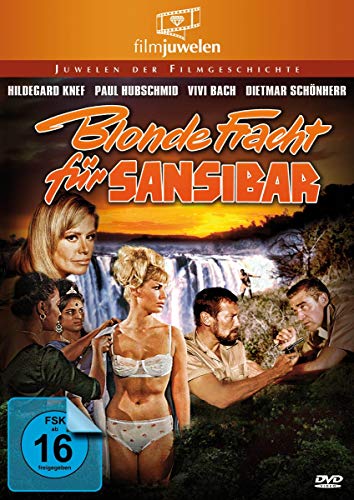![Funeral In Berlin [1967]](/pictures/1001975.jpg) Funeral In Berlin | DVD | (05/01/2004)
from £5.00
| Saving you £10.99 (219.80%)
| RRP
Funeral In Berlin | DVD | (05/01/2004)
from £5.00
| Saving you £10.99 (219.80%)
| RRP Funeral in Berlin (1967) is the sequel to 1965's The Ipcress File, again featuring Michael Caine as reluctant spy Harry Palmer. It was clearly the filmmakers' intention to make Palmer a harder-nosed James Bond, and director Guy Hamilton was brought to this project in between Goldfinger and Diamonds Are Forever for that purpose. There's espionage intrigue, easy women (Eva Renzi as Samantha Steel), and gunplay. But without the gadgetry, one-liners, or even the John Barry score of the first movie, the Bond comparison runs dry. Against the backdrop of a bombed-out industrial wasteland that was Berlin in the mid-Sixties, Palmer is sent to facilitate the defection of Col. Stock (Oscar Homolka). Numerous sub-plots weave together involving indifferent chief Ross (Guy Doleman from IPCRESS), mission aide Johnnie Volkon (Paul Hubschmid), and the untrustworthy Kreutzman (Günter Meisner, who was more memorable as Slugworth in Willy Wonka and The Chocolate Factory). It all comes down to revealing who's working for whom and who's really defecting in the set-piece funeral of the title. The main reason the series continued (Ken Russell's OTT Billion Dollar Brain came next) was the commanding presence of Caine. It's fun to hear him try German, and he manages a few subtle comic gems, such as when a waiter asks "Bitte mein heir?" and he replies, "No. Lager please", but the best moment of characterisation recalling the womanising Palmer of Len Deighton's novels is the put down guaranteed to win any woman: "You're useless in the kitchen. Why don't you go back to bed?" --Paul Tonks
![Der Tiger von Eschnapur / Das indische Grabmal (Fritz Lang's Indian Epic) [Masters of Cinema] [DVD] [1959]](/pictures/1106803.jpg) Der Tiger von Eschnapur / Das indische Grabmal (Fritz Lang's Indian Epic) | DVD | (18/04/2011)
from £N/A
| Saving you £N/A (N/A%)
| RRP
Der Tiger von Eschnapur / Das indische Grabmal (Fritz Lang's Indian Epic) | DVD | (18/04/2011)
from £N/A
| Saving you £N/A (N/A%)
| RRP Fritz Lang returned to Germany on the eve of the 1960s to direct this enchanted penultimate work a redraft of the diptych form pioneered in such silent Lang classics as Die Spinnen; Dr. Mabuse der Spieler.; and Die Nibelungen. Although no encapsulating title was lent at the time of release to what is effectively a single 3-hour-plus film split in two the work that has come to be referred to in modern times as the Indian epic (consisting of Der Tiger von Eschnapur and Das indische Grabmal) proved to be one of the legendary director's most adventurous achievements. It was also one of the most popular successes Lang was to experience in his native land. A German architect (Paul Hubschmid) is commissioned by an Indian maharaja (Walter Reyer) to construct a temple on his palatial grounds. After saving the life of a bewitching dancer (Debra Paget) on whom the maharaja has spousal designs the pair are drawn into a hazardous maze of traps perhaps the purest realisation of Lang's obsession with a labyrinthine 'house of traps' - that is Man challenging Fate. Like Lang's following final work Die 1000 Augen des Dr. Mabuse the Indian epic charts new territory for the director as it strikes out into the ber-melodramatic tenor of his early silents while instigating the colours of his emulsion into adopting a lurid sometimes gaseous palette. Arriving in the wake of The River (Renoir) India matri bhumi (Rossellini) and Black Narcissus (Powell & Pressburger) it also stands among the remarkable mid-century contributions of the greatest Western filmmakers who have explored India.
![The Beast From 20000 Fathoms [1953]](/pictures/1029124.jpg) The Beast From 20000 Fathoms | DVD | (26/01/2004)
from £21.64
| Saving you £-7.65 (N/A%)
| RRP
The Beast From 20000 Fathoms | DVD | (26/01/2004)
from £21.64
| Saving you £-7.65 (N/A%)
| RRP An atomic bomb tested in the Arctic frees a gigantic dinosaur from the icy tomb that has encased it for 100 million years. An ice fall kills all witnesses except one Professor Tom Nesbitt (Paul Hubschmid) who returns to New York with the fantastic story. No one will believe his tale but the truth is revealed when the beast emerges from the ocean and lays waste to Manhattan! Can the Professor come up with a plan to save the city before it's too late?
![Mozambique [DVD]](/pictures/1138786.jpg) Mozambique | DVD | (18/01/2016)
from £6.06
| Saving you £3.93 (64.85%)
| RRP
Mozambique | DVD | (18/01/2016)
from £6.06
| Saving you £3.93 (64.85%)
| RRP Featuring in his final film, White Heat star Steve Cochran plays a world-weary, out-of-work pilot who accepts an offer of work in Mozambique and soon finds himself immersed in a world of drug smuggling and white slavery!Thrills, excitement and exotic locations add up to compulsive viewing in this Anglo-German adventure from the mid-1960s. Produced by B-movie meister and cult favourite Harry Alan Towers and scripted by noted screenwriter, playwright and novelist Peter Yeldham, Mozambique is presented in a brand-new transfer from original film elements in its as-exhibited theatrical aspect ratio.SPECIAL FEATURES:Original Theatrical TrailerImage GalleryPromotional Materials PDF
 Blonde Fracht für Sansibar | DVD | (10/01/2014)
from £N/A
| Saving you £N/A (N/A%)
| RRP
Blonde Fracht für Sansibar | DVD | (10/01/2014)
from £N/A
| Saving you £N/A (N/A%)
| RRP 
Please wait. Loading...
This site uses cookies.
More details in our privacy policy